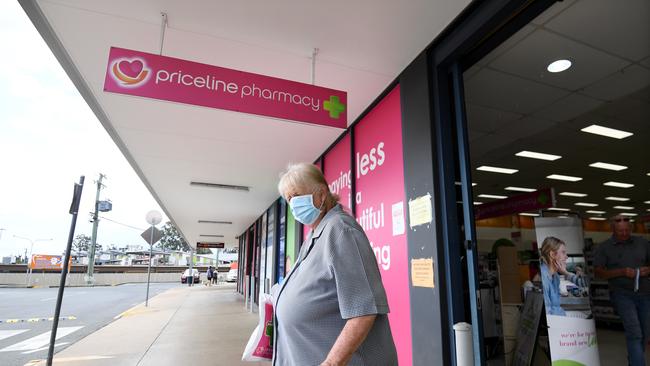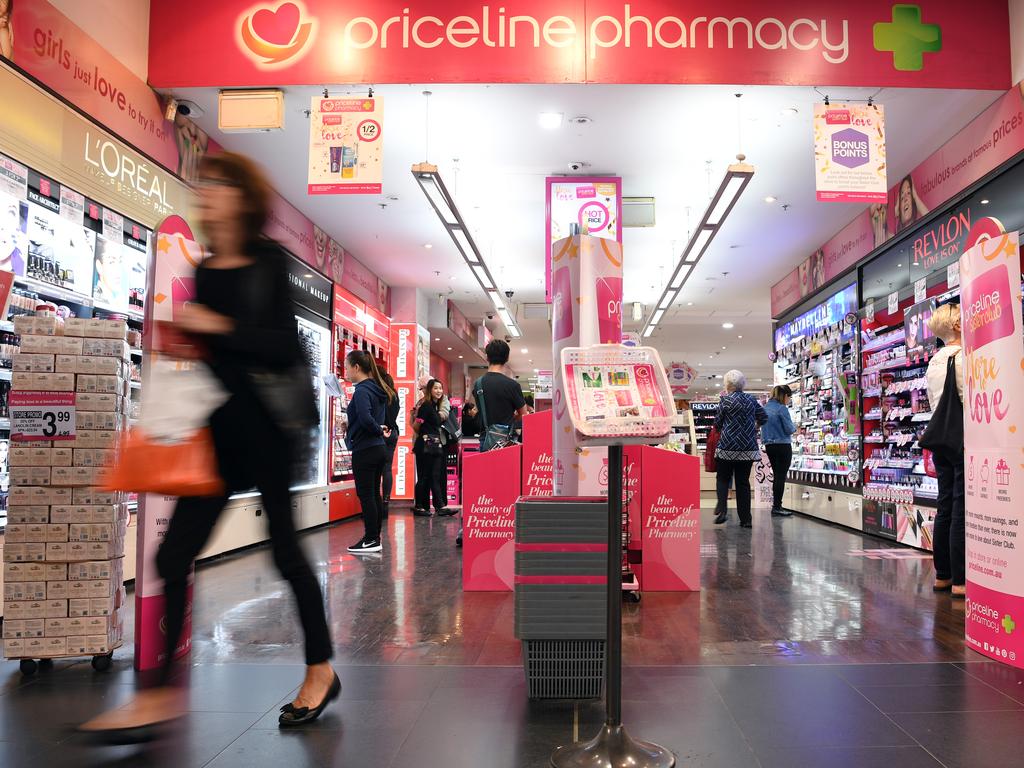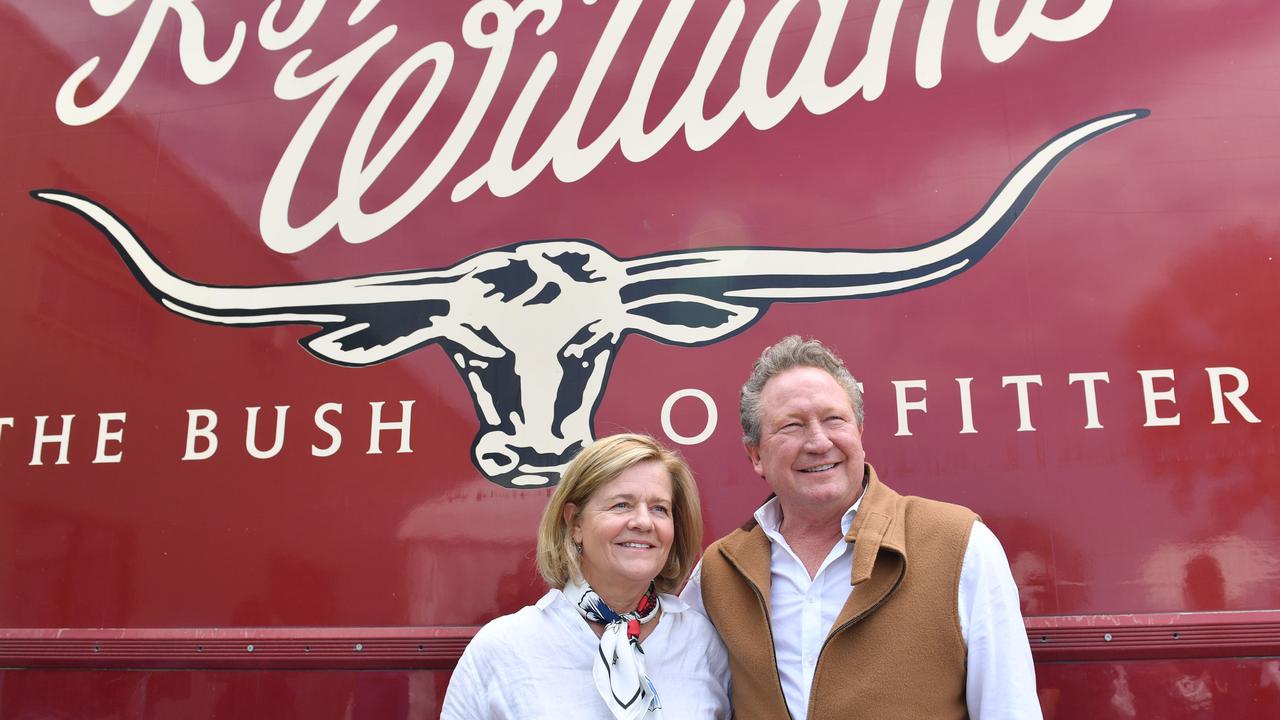Stop-start COVID-19 lockdowns hit Priceline owner Australian Pharmaceutical Industries
Australian Pharmaceutical Industries has repeated its threat to close CBD Priceline stores, as its half-year profit dived.

The owner of Priceline, Australian Pharmaceutical Industries, has “caught a cold” after the COVID-19 caused the $US500bn cosmetics market to sneeze.
Working from home, combined with a dramatic scaling back of events from the Spring Racing Carnival to simply eating out, hammered API’s overall profit, which fell 29.3 per cent to $15.9m, in the six months to February 28.
Register revenue across Priceline plummeted 10.7 per cent to $526m, while gross profit across stores fell 8 per cent to $103m. And a recovery is difficult to predict as more workers swap the commute for a laptop and Zoom.
API chief executive Richard Vincent said this has fuelled a drop in sales of cosmetic items including mascara, lip liners and lipsticks.
“We are the biggest player in the cosmetics space, and the highest market share. If the cosmetics market has a sneeze, we get a cold,” Mr Vincent said.
“So we are impacted more than others. But what we are seeing is that because women are working from home, because there are not the same level of events going on — whether it’s going out for dinners, spring carnivals in racing, all sorts of different areas — the amount of makeup that’s being purchased has gone down.”
This is employees spending more time in front of the camera on Zoom meetings and a range of cosmetic companies, including L’Oreal and Revlon, promoting make-up routines of how to look your best on video calls.
According to Revlon: “You don’t have to wear make-up. But it helps”. And it appears to be the former, according to Mr Vincent.
“It’s a mixed bag, I can tell you, because we have got thousands of employees and I see all different types of presentation on the other end of the line.
“There’s something in the psyche that if you’re going into the office to work you do make that extra effort.”
But the pandemic and remote working hasn’t completely ended people’s beauty regimes. Mr Vincent said fragrance sales “remained strong” as was skincare.
“Maybe there is something about the psyche that ‘you still need to put a little bit of perfume on’.
“And when it comes to skincare, the general trends that were there pre-COVID are still there, so products that are green and good for the environment and good for your body — people are still buying those products.
“And they are buying high quality, inexpensive products. We’ve got one range called The Ordinary, which has a very high following with women. It’s a skincare range and we have been selling packet loads of that right through the COVID-19 period.”
API shares fell 1.5 per cent to $1.34 on Friday compared with a 0.8 per cent gain across the broader share market.
On and off again lockdowns from Melbourne to Auckland also winded API, with overall half-year revenue sagging 2.6 per cent to $1.98bn.
“Priceline Pharmacy’s like-for-like sales were down significantly in its two largest CBDs with Melbourne down by 65 per cent and Sydney down by 51 per cent,” Mr Vincent said.
“The Melbourne lockdown persisted into early November and we had further lockdowns in December in parts of Sydney and Auckland. While CBD foot traffic is slowly recovering, it was well below the prior period and consequently first half retail trading results are significantly below last year’s COVID-free result.”
Mr Vincent reiterated his threat, first made last year, to close Priceline stores if API failed to renegotiate lease agreements with its landlords.
“We continue to renegotiate leasing agreements with our CBD landlords and these negotiations are helped by our proven determination to close stores where we cannot achieve satisfactory rental agreements.
“We’re typically working to the principle of the rental code, so rents being pegged to turnover. Even though that was designed for small business, we are using that because we think there’s sensible logic.
“If sales would come down by 20 per cent, we’d expect rent to come down by the same. That’s where we start the conversation.”
Across its pharmacy distribution business, revenue was steady at $1.46bn, easing 0.9 per cent on the previous corresponding period. Mr Vincent attributed the flat revenue growth to the loss of its Chemist Warehouse over-the-counter contract after its “temporary arrangement” with the pharmacy chain ended.
But he was confident the distribution business was positioned for growth despite the Chemist Warehouse agreement expiring.
“This (Chemist Warehouse loss) was largely offset by the expansion of API’s independent community pharmacy distribution business, resulting in gross profit increasing to $114m from $112m on the previous corresponding period.
“The increase in gross profit also reflects the recently negotiated wholesaler remuneration as part of the seventh community pharmacy agreement.”
Mr Vincent said the pharmacy agreement provided certainty across the business, so much so that it has began building a new NSW distribution centre, which “will employ leading edge technology”.
“The benefits we’ll reap from our investment in the Marsden Park distribution centre, allied to further initiatives to streamline our distribution network, means we can be confident of ongoing robust returns on capital employed and future cash generation.”
“We’ve taken the necessary measures to ensure we have the balance sheet to grasp all the growth opportunities that we’ve identified for our existing businesses and to make any additional moves that we deem will increase shareholder value.
“Assuming we do not experience any more major economic shocks, such as higher than anticipated unemployment levels, and on the basis that workers return to shopping in the CBDs, we expect our full year profit result to be broadly in line with current market expectations.”
The company will pay an interim dividend of 1.5c a share, fully franked, on June 4.




